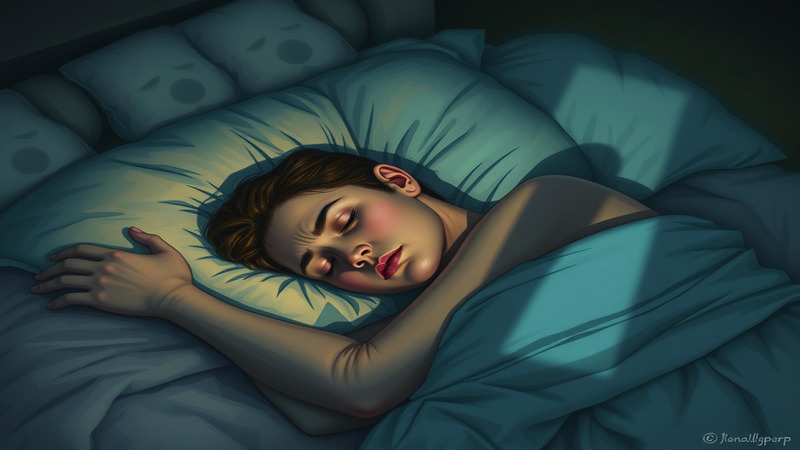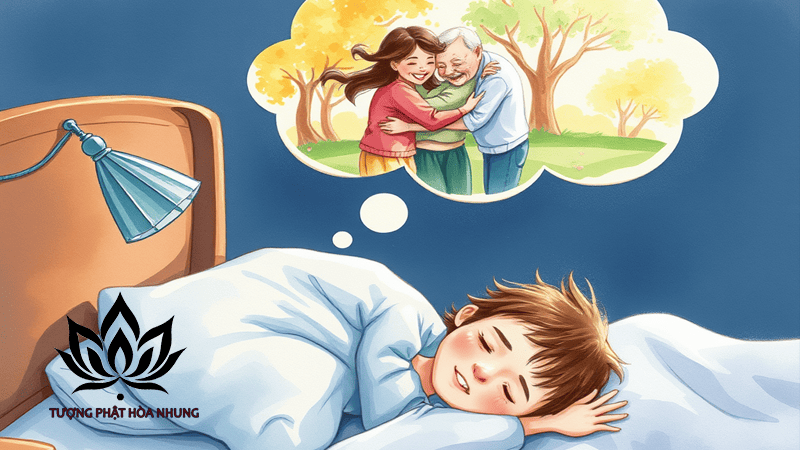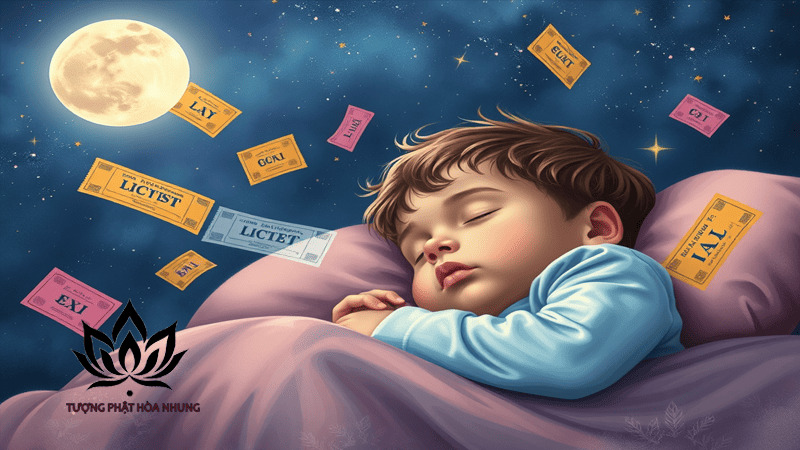Have you ever woken up with a vivid image of someone in your mind, wondering why do we dream about people? Dreams are a universal human experience, a nightly theater produced by our own minds. These nocturnal narratives often feature a cast of characters – familiar faces, strangers, even celebrities – leaving us pondering their significance. What do these appearances mean, and what can they tell us about ourselves?

Why Do We Dream About People? Exploring the Landscape of Dreams
Dreams have captivated philosophers, scientists, and artists for centuries. The appearance of people within our dreams is particularly intriguing. It prompts us to delve into the science, psychology, and cultural interpretations of these nightly visions.
The Science Behind Dreaming
Dreams primarily occur during the REM (Rapid Eye Movement) phase of sleep, a period characterized by heightened brain activity. During REM sleep, our brain waves resemble those of a waking state, and this is when the most vivid and emotional dreams are experienced. Scientists are still actively researching the purpose of dreams, but several compelling theories exist.
Key Theories About Dreaming:
- Memory Consolidation: Dreams may play a role in processing and storing memories.
- Emotional Regulation: Dreams could help us manage and process our emotions.
- Problem-Solving: The dream world might offer a space for creative problem-solving and exploring different scenarios.
- Subconscious Processing: Dreams can provide a window into our subconscious thoughts, desires, and fears.
When people appear in our dreams, it is often linked to these functions. The individuals we dream about, whether they are friends, family, or strangers, often reflect our emotional states, unresolved issues, or the way we process recent experiences.
The Psychology of Dream Appearances
Psychologically, the people in our dreams can represent various aspects of ourselves, our relationships, and our emotional landscape. Understanding the role these individuals play can offer valuable insights into our waking lives. The way we interact with these people in our dreams, the emotions they evoke, and the context in which they appear all contribute to the overall meaning.
Personal Experience: A Dream About My Grandmother
I remember a vivid dream I had about my grandmother, who passed away several years ago. In the dream, she was in her garden, tending to her roses, just as she used to do in real life. I felt an overwhelming sense of peace and comfort in her presence. Later, reflecting on this dream, I realized that it was my mind’s way of processing my grief and reconnecting with the love and wisdom she represented in my life. This personal experience reinforces the profound impact that dream figures can have and how they tie into our emotional and memory processes.

Dreaming About People We Know: Reflecting Our Relationships
Dreams often mirror our relationships, both positive and negative, with the people in our lives. The significance of dreaming about someone familiar can vary based on the emotional connection we have with them, recent interactions, and personal associations.
Emotional Significance: The Power of Feelings
We are more likely to dream about those who elicit strong emotions in us, whether it be love, anger, fear, or admiration. Our brains dedicate more processing power to emotionally charged figures, making them more likely to appear in our dreamscapes. This is because emotional events and relationships tend to be more deeply encoded in our memory.
- Example: If you are constantly in conflict with a colleague at work, you might dream about arguing with them or trying to resolve the conflict in a different way.
Unresolved Feelings: Tying Up Loose Ends
Sometimes, dreams bring back people we haven’t seen in a long time because there is unfinished business or lingering emotions associated with them. This could be due to a lack of closure after a breakup or unresolved feelings towards a deceased loved one. The subconscious mind utilizes the dream world to create scenarios in which we can process these emotions and potentially find resolution.
- Example: Dreaming about an old friend with whom you had a falling out could indicate a desire for reconciliation or a need to process the hurt feelings from the past.
Memory Replay: Organizing Our Minds
Our brains consolidate memories during sleep. Someone you interacted with recently, even briefly, may appear in your dreams simply because your mind is organizing and filing away recent experiences. This doesn’t necessarily mean that the person holds deep significance, but rather that they are part of your recent mental landscape.
- Example: Dreaming about a barista at your favorite coffee shop could simply mean that your brain is processing the events of your morning routine.
Dreaming About Strangers: Unveiling Symbolic Meanings
Many people report dreaming about individuals they do not recognize. These strangers can be puzzling, but they often carry symbolic weight and can offer valuable insights into our subconscious.
Composite Faces: Assembling Familiar Features
Research suggests that many strangers in our dreams are actually composite faces made up of features we’ve seen before, even subconsciously. These faces may be assembled from glimpses of people we’ve encountered on the street, in movies, or in advertisements. Our brains utilize their vast archive of facial features to create new characters for our dream narratives.
- Expert Insight: Studies in cognitive psychology have shown that our brains are highly adept at recognizing and processing faces, even with limited exposure. This ability contributes to the creation of these composite faces in our dreams.
Symbolic Representation: Unmasking Hidden Emotions
Often, a stranger represents an emotion, fear, desire, or aspect of ourselves that we are not fully aware of in our waking lives. For example, a threatening figure chasing you in a dream might symbolize anxiety or a looming deadline, rather than a real person. Understanding the symbolism attached to these strangers can help us decipher the underlying messages of our dreams.
- Example: A kind, elderly stranger offering guidance in a dream could represent wisdom, mentorship, or the need for guidance in your current situation.
Shadow Selves and Archetypes: Exploring the Unconscious
According to Carl Jung, strangers in dreams may represent parts of your shadow self – the unconscious aspects of your personality that you do not fully acknowledge or accept. The stranger might be a representation of you, wearing a symbolic mask. These figures often embody traits that we repress or deny in ourselves. By confronting these shadow figures in our dreams, we can gain a deeper understanding of our whole selves.
- Jungian Perspective: Jung believed that integrating our shadow self is essential for psychological wholeness and self-realization.
Common Dream Scenarios and Interpretations
Let’s explore some common dream scenarios involving people and their potential interpretations:
- Dreaming About an Ex: This does not necessarily mean that you still love or miss them. It could indicate:
- You’re processing lessons from that past relationship.
- You’re reflecting on your current emotional needs.
- You’re facing a similar issue in a new relationship.
- Dreaming About a Celebrity: It’s unlikely you will meet them. More likely:
- They symbolize aspirations or qualities you admire.
- You’re projecting your ambitions or desires for attention or validation onto them.
- Dreaming About a Family Member: Often tied to core identity, childhood memories, or emotional roots.
- A peaceful dream might symbolize security and comfort.
- A chaotic dream could reflect family tension or unresolved issues.
- Dreaming About a Friend: Could signify:
- You value the friendship and are emotionally invested.
- You’re working through a conflict or tension within the friendship.
- Your friend represents a trait you need, such as confidence or honesty.
- Dreaming About Someone Who Has Passed Away: These are often deeply emotional and can be interpreted as:
- Your brain processing grief or longing.
- A spiritual or symbolic visitation, depending on your beliefs.
- Your mind’s attempt to reconnect with love, comfort, or wisdom.
Psychological Theories: Perspectives from Experts
Various psychological theories offer different frameworks for understanding dreams and the people within them.
Freud’s Theory: Unveiling Repressed Desires
Sigmund Freud believed that dreams are expressions of repressed desires, often sexual or taboo. In this view, dreaming about people reflects hidden wishes or internal conflicts. Freud’s theories, while controversial, have had a profound impact on the study of dreams and the subconscious mind.
Jung’s Collective Unconscious: Tapping into Universal Themes
Carl Jung proposed that dreams draw from a collective unconscious, filled with symbols and archetypes that are shared by all humanity. Dreaming of people could mean that you are confronting universal human themes, such as the mother, the hero, the villain, or the lover. Jung believed that these archetypes represent fundamental aspects of the human experience.
Contemporary Neuroscience: Processing and Problem-Solving
Modern psychology leans more towards the idea that dreams help us process daily experiences, solve emotional or social dilemmas, and improve memory and decision-making. Dreaming about people may serve a practical mental purpose, helping us prepare for future interactions and navigate complex social situations. Neuroscientific research continues to shed light on the brain mechanisms involved in dreaming and their potential functions.
Cultural Interpretations: Diverse Perspectives
Across cultures, dreams have been treated as messages, omens, or spiritual experiences. Here’s how some cultures interpret dreaming of people:
- Native American Traditions: Dreams are sacred and may bring messages from ancestors or the spirit world. The people who appear in these dreams are often seen as messengers or guides.
- Chinese Dream Theory: Seeing someone in a dream can be connected to yin-yang imbalances or future events. Different individuals may represent different aspects of your life or potential future outcomes.
- Islamic Interpretation: Dreams are categorized as coming from the self, Satan, or divine sources. Dreaming of a person may carry a spiritual or moral lesson. These dreams are often interpreted in the context of Islamic teachings and principles.
Can You Influence Your Dreams?
Yes, to some extent. This process is known as dream incubation, a technique used to influence the content of your dreams.
Methods to Influence Your Dreams:
- Visualization Before Sleep: Think intensely about a person you want to dream about before falling asleep. Focus on their face, their voice, and your interactions with them.
- Keeping a Dream Journal: Writing down your past dreams increases dream recall and awareness, making it easier to identify patterns and potentially influence future dreams.
- Lucid Dreaming Techniques: These techniques can allow you to take control of your dream narratives, including interacting with specific people within your dreams. Lucid dreaming involves becoming aware that you are dreaming while you are still in the dream state.
Should You Be Concerned?
Not usually. Most dreams are harmless expressions of your emotional or mental processing. However, recurring or disturbing dreams involving a specific person may indicate:
- An unresolved trauma or relationship issue.
- Repressed emotions or guilt.
- Anxiety or subconscious fear.
If your dreams are causing distress or interfering with your sleep, consider speaking with a therapist or dream analyst. They can help you explore the underlying causes of your dreams and develop coping strategies.

Practical Tips for Understanding Your Dreams
Here are some practical tips that can help you understand your dreams involving other people:
- Keep a Dream Journal: Write down details immediately after waking up. Note who appeared, what they did, and how you felt.
- Look for Emotional Patterns: Was the dream loving, terrifying, or confusing? Emotions often reveal the meaning more than events.
- Ask Yourself What the Person Represents: Are they a symbol of love, betrayal, authority, or freedom?
- Consider Context Over Literal Meaning: Dreams speak in metaphors. Being yelled at by a teacher in a dream might reflect self-criticism, not the teacher themselves.
- Practice Mindfulness and Self-Inquiry: Dreams are mirrors. The more aware you are of your waking life, the more you’ll understand your sleeping one. Mindfulness and self-inquiry can help you identify patterns in your thoughts, feelings, and behaviors, which can then be reflected in your dreams.
See more: Dream Travel: The Ultimate Guide To Your Soulful Journey
Conclusion
Why do we dream about people? As Tượng Phật HN, we believe dreaming about people is a profound human experience, a nightly reflection of our waking lives. Whether you’re reliving old memories, processing emotional wounds, or encountering a part of yourself in disguise, these figures are more than just nighttime hallucinations. They are symbols, messengers, and sometimes, mirrors of our deepest truths. So the next time you wake up wondering about the people in your dreams, take a moment to reflect – your mind may be telling you more than you realize.








